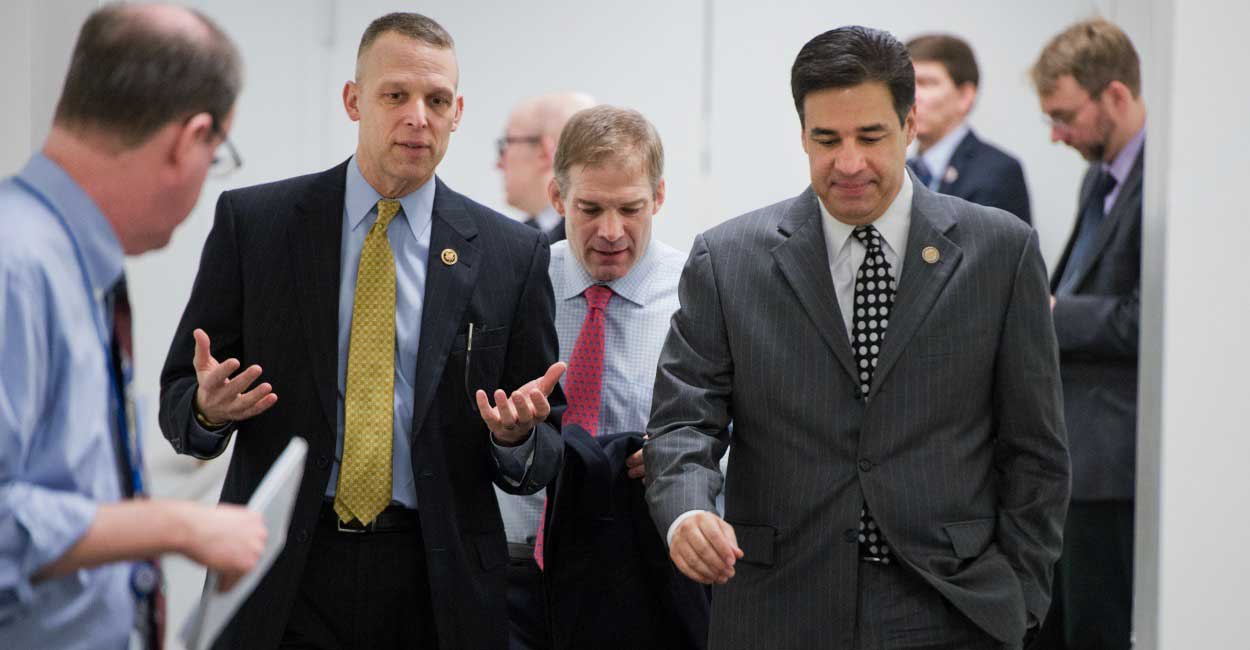Nebraska Woman Loses Health Insurance for Fourth Time Under Obamacare
Melissa Quinn /
Pamela Weldin’s experiences with Obamacare can be boiled down to just a few numbers.
Since the health care law’s implementation three years ago, Weldin, 60, has lost her insurance four different times.
And the Nebraska woman is currently enrolled in her fifth new insurance policy in four years.
“Yet again, and through no fault of my own,” Weldin told The Daily Signal. “I’m just sitting here minding my own business, and here we go again.”
A former dental hygienist, Weldin has all the hallmarks of a consumer intended to benefit from the Affordable Care Act.
She has been denied coverage in the past because of a pre-existing condition related to her career as a dental hygienist.
Additionally, Weldin qualifies for a tax credit, which she has received every year since 2014.
As a result, her premiums are low when compared to consumers who don’t qualify for financial assistance: In early 2015, Weldin purchased a plan through Blue Cross and Blue Shield of Nebraska that cost her $232 each month.
This year, premiums for her silver-level plan with Medica are $161 per month after her tax credit.
But though Weldin has benefited from aspects of the law, she hasn’t been immune to the changes in the health insurance market that have occurred in last few years.
“I’m a person who has been denied because of pre-existing conditions,” Weldin, a Pampered Chef director, said. “I’m on Obamacare and have lost my insurance four times in three years. I understand the challenges, but it’s not sustainable.”

Pamela Weldin of Minatare, Nebraska, lost her insurance four times since the Affordable Care Act took effect in 2014. (Photo: Pamela Weldin)
Weldin’s Journey
Since HealthCare.gov opened for business in the fall of 2013, four policies sold by three different insurance companies—Humana, CoOportunity Health, and Blue Cross and Blue Shield of Nebraska—that Weldin purchased were ultimately terminated.
The Daily Signal previously covered her experiences with Obamacare in a February 2015 article.
But since then—when Weldin lost her insurance for a third time—she’s logged another cancellation.
First, Weldin’s initial policy with Humana, which she held for several years, was canceled in the lead-up to Obamacare’s implementation in January 2014.
The Nebraska woman then purchased a platinum-level plan for 2014 through CoOportunity Health, a consumer operated and oriented plan, or co-op. But CoOportunity Health terminated her platinum-level policy for 2015 after the co-op decided it would no longer offer those policies.
Weldin, though, decided to stick with CoOportunity Health and selected a silver-level plan for 2015.
On Jan. 23, 2015, Weldin received a notice from the co-op notifying her that it was going out of business. CoOportunity far outpaced its initial enrollment projections, and its customers racked up medical expenses that far outpaced what they paid in premiums.
Weldin had no choice but to select a new insurer and policy, and purchased coverage through Blue Cross and Blue Shield of Nebraska for the remainder of 2015 and 2016—a plan that, though a bit more expensive, allowed her to see her original doctor.
Late last year, though, Blue Cross and Blue Shield of Nebraska announced it would no longer sell coverage on the exchange in the state.
“This system is collapsing under its own weight,” Weldin said, “like the co-ops and basic companies like Blue Cross pulling out of Nebraska.”
To ensure she would be covered for 2017, Weldin went to HealthCare.gov to select a plan that allowed her to see her current doctor in Colorado.
In Nebraska, consumers on the exchange had just two insurance companies to choose from: Aetna and Medica.
A policy through Aetna was more expensive than its competitor, but because Weldin thought her doctor was considered in-network, she selected a plan through that insurer.
It wasn’t until after she paid her first month’s premium, however, that Weldin learned from the insurance company that any doctor located more than 100 miles from her rural Nebraska home wasn’t in her network.
If she wanted to see her doctor in Colorado—considered out-of-network now—Weldin had to meet a $20,000 out-of-network deductible before Aetna would start covering her medical expenses.
That information, she said, wasn’t listed on HealthCare.gov when she was shopping for plans.
“$20,000 for a deductible? Are you kidding me?” Weldin said. “How is that affordable?”

From left, Republican Reps. Scott Perry, Jim Jordan, and Raul Labrador spoke about Obamacare repeal at a monthly press Q&A session. (Photo: Tom Williams/CQ Roll Call/Newscom)
Speaking Volumes
Across the country, millions of Americans faced higher premiums heading into 2017.
And premium hikes have been well documented by The Daily Signal and others.
Less attention, however, has been paid to the number of insurers and plans available to consumers.
According to an October report from the Department of Health and Human Services, insurer participation in Nebraska decreased from four insurers in 2016 to two in 2017.
And consumers nationwide aren’t just seeing a decline in the number of insurance companies selling coverage on the exchange in their states.
The federal government reported that Americans would also see a decrease in the number of plans insurers offered in 2017.
In Nebraska, there was an average of 18 fewer plans per county available on the exchange to consumers this year. Nebraskans purchasing plans on HealthCare.gov in 2017 had 13 plans to choose from, down from 31 last year.
“That speaks volumes in terms of ultimate consumer benefits,” Rep. Adrian Smith, R-Neb., told The Daily Signal of the change in insurers selling plans in his state. “Fewer choices most often means higher prices and less quality.”
In 2015, Smith introduced a bill to exempt consumers like Weldin who purchased coverage from a failed co-op from the individual mandate. The legislation passed the House, but stalled in the Senate.
Now, Smith and other Republicans—who have spent six years talking about repealing Obamacare—are looking to check the box on a major campaign promise.
Republicans have taken the initial step toward dismantling the health care law after passing a budget resolution earlier this month, and often cite the experiences of Americans like Weldin to bolster their arguments that Obamacare needs to be repealed and replaced.
But despite their control over Congress and the White House, Republican lawmakers differ on their approaches to unwinding Obamacare.
Conservatives are urging GOP leadership to move forward with repeal as soon as possible and say they’re frustrated with the speed at which their leaders are moving to dismantle the health care law.
House Speaker Paul Ryan said last week repeal would be slated for March or April.
“I’d like to see an acceleration of the front-end repeal side,” Rep. Jim Jordan, R-Ohio, said Wednesday at a monthly gathering with reporters. “Let’s get rid of [Obamacare]. That’s what we told the voters that we were going to do.”
Jordan was joined by other Republicans who said they want to see GOP leadership move faster on Obamacare repeal.
“I, too, am frustrated with the pace,” Rep. Scott Perry, R-Pa., said Wednesday. “We need to not only be against the [Affordable Care Act] or Obamacare, which I am for a myriad of reasons … but we also, if not for political reasons, but for the reason that our constituents and America needs to know what we stand for. We should vote on something.”
But during a gathering last week of House and Senate lawmakers in Philadelphia, other Republicans showed tepid support for dismantling the law and even expressed doubts over their party’s plans to repeal and replace Obamacare.
Though the GOP agrees that the law needs to be scrapped, members haven’t yet concurred on whether to repeal major parts of Obamacare like its taxes. Many also want to see Congress move a replacement at the same time they repeal the law.
Still, Smith, the Nebraska congressman, points to Americans like Weldin as a reason why Congress needs to act.
“When you look at the overall picture, [Obamacare] has failed miserably and will continue to cause great damage,” Smith said. “That’s why we need to step in.”
“We want to prevent further pain that we know will happen if we just let Obamacare sit the way it is,” he continued.

“I’m on Obamacare and have lost my insurance four times in three years,” Pamela Weldin said. “I understand the challenges, but it’s not sustainable.” (Photo: Pamela Weldin)
‘Not Sustainable’
After learning about her $20,000 out-of-pocket deductible, Weldin contacted HealthCare.gov to seek assistance with purchasing another plan.
A representative there was able to enroll her in a new policy with Medica, and Weldin learned that her doctor was, in fact, included in the new plan’s network.
This year, the Nebraska woman will pay $161 per month in premiums after a tax credit.
Weldin is one of the more than 9 million Americans who receives a tax credit and has been relatively immune to the increased costs of health insurance, but she still wants to see changes made to the health care system.
“Allow us the choice of what kind of policy and coverage suits our needs,” she said. “Allow us the choice of deductible and to cross state lines for provider care so we can choose and keep our own doctors. Allow insurance companies to compete across state lines so we have more options and have more choice of providers.”
And Weldin said she recognizes that any action Republicans take on Obamacare could very well lead to further changes with her insurance and the health insurance market.
Still, she said she wants to have additional choices, even it means more coming out of her pocketbook.
“Something has to be done because this is not sustainable,” Weldin said. “I’m fine paying a little bit more if it’s what I need. But let me choose a policy that’s appropriate for my needs. Let me have a policy that’s appropriate to my medical needs. Let me choose a deductible that’s appropriate for my budget.”
This article has been modified.
